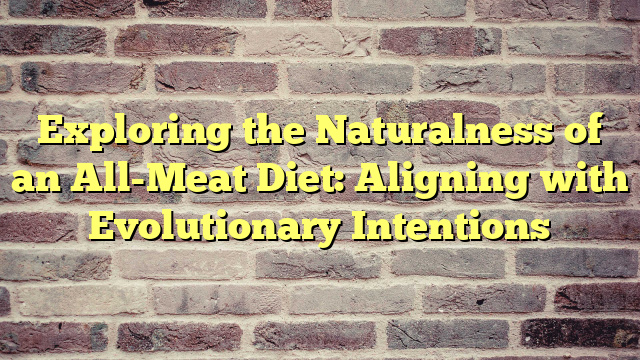Exploring the Naturalness of an All-Meat Diet: Aligning with Evolutionary Intentions
Exploring the Naturalness of an All-Meat Diet: Aligning with Evolutionary Intentions
The debate surrounding the health implications and naturalness of an all-meat diet has been a topic of interest among nutritionists, anthropologists, and health enthusiasts for years. This article delves into the evolutionary perspective of human diets, the potential benefits, and the concerns associated with consuming an exclusively carnivorous diet.
Understanding the Evolutionary Diet
Human dietary patterns have evolved significantly over millions of years. Our ancestors’ diets varied greatly depending on geographical location, climate, and available resources. However, a common thread among early humans was the consumption of animal products.
Historical Dietary Patterns
- Paleolithic Era: The diet consisted mainly of wild animals, fish, fruits, vegetables, nuts, and seeds.
- Neolithic Revolution: The introduction of agriculture shifted diets towards more plant-based foods, including grains and legumes.
- Industrial Revolution: Processed foods and refined sugars became more prevalent, significantly altering human diets.
Anthropological Evidence
Studies of ancient human remains and isotopic analysis have provided insights into the diets of our ancestors. Evidence suggests that in regions where game was abundant, early humans exhibited dietary patterns with a high reliance on animal products.
The All-Meat Diet: A Modern Interpretation
The all-meat diet, often referred to as the carnivore diet, consists exclusively of animal products. Proponents argue that this diet aligns with our evolutionary dietary patterns and offers numerous health benefits.
Components of the Carnivore Diet
| Food Group | Examples |
|---|---|
| Meat | Beef, pork, lamb, game meats |
| Poultry | Chicken, turkey, duck |
| Fish and Seafood | Salmon, mackerel, shrimp, lobster |
| Eggs and Dairy | Eggs, cheese, butter |
Claimed Benefits
- Weight loss and improved body composition
- Reduced inflammation and autoimmune symptoms
- Enhanced mental clarity and energy levels
- Simplified dietary choices
Addressing Concerns and Criticisms
Despite its popularity, the all-meat diet faces criticism from various health professionals and organizations. Key concerns include the lack of dietary fiber, potential nutrient deficiencies, and the environmental impact of high meat consumption.
Nutritional Deficiencies
Excluding plant-based foods can lead to deficiencies in vitamins C and E, fiber, and certain phytonutrients. Proponents argue that organ meats can provide most necessary nutrients, but critics emphasize the importance of a varied diet.
Environmental Considerations
The environmental impact of meat production, including greenhouse gas emissions and land use, is a significant concern. Sustainable meat consumption practices, such as choosing grass-fed and locally sourced meats, can mitigate some of these impacts.
Conclusion: A Balanced Perspective
While the all-meat diet may offer benefits for some individuals, it is essential to consider the potential health risks and environmental implications. A balanced approach, incorporating a variety of nutrient-dense foods, may be more aligned with both our evolutionary heritage and contemporary health needs. Consulting with healthcare professionals and considering individual health conditions and dietary preferences are crucial steps before making significant dietary changes.
Further Reading and Resources
- The Paleo Diet by Loren Cordain
- The Carnivore Code by Paul Saladino
- National Institutes of Health (NIH) Dietary Guidelines

